Zero Waste: Addressing Food Insecurity and Sustainability
Blog
Introduction
Welcome to Iglesia Cristiana Getsemani's Zero Waste initiative! We are committed to addressing food insecurity and promoting sustainability in our community. Through this comprehensive program, we aim to create a more sustainable future by minimizing waste and optimizing the use of resources.
The Problem of Food Insecurity
Food insecurity is a widespread issue that affects millions of people around the world. Unfortunately, many individuals and families struggle to access nutritious and affordable food, leading to negative impacts on health and well-being. At Iglesia Cristiana Getsemani, we believe that everyone should have access to fresh, healthy food, regardless of their socio-economic circumstances.
Our Zero Waste Approach
Our Zero Waste initiative is designed to tackle both food insecurity and sustainability. By adopting a holistic approach, we aim to reduce food waste, promote responsible consumption, and support local communities.
1. Food Recovery
One of the key pillars of our Zero Waste initiative is food recovery. We partner with local food banks, shelters, and community organizations to rescue surplus food from going to waste. Through careful planning and distribution, we aim to ensure that excess food reaches those in need, minimizing food waste and addressing food insecurity simultaneously.
2. Sustainable Agriculture
We understand the importance of sustainable agriculture in creating a more resilient food system. As part of our initiative, we promote and support local farmers who employ sustainable farming practices. By prioritizing organic farming, reducing the use of harmful chemicals, and encouraging regenerative techniques, we contribute to the overall health of our environment while ensuring the availability of nutritious food for future generations.
3. Community Engagement
Community involvement is crucial to the success of our Zero Waste initiative. We actively engage and educate our community members about the importance of reducing waste and making sustainable choices. Through workshops, seminars, and outreach programs, we empower individuals to take action and make a positive impact on the environment.
4. Recycling and Composting
Proper waste management is at the core of our Zero Waste strategy. We encourage recycling practices within our community, emphasizing the importance of sorting and separating recyclable materials. Additionally, composting is promoted as a means to transform organic waste into nutrient-rich soil, supporting local gardening efforts and reducing the amount of waste sent to landfills.
The Impact of Zero Waste Practices
By implementing our Zero Waste practices, we can achieve significant positive impacts:
1. Food Security
Our efforts to recover surplus food and distribute it to those in need directly address food insecurity. Through strategic partnerships and efficient distribution networks, we strive to minimize hunger and ensure access to nutritious food for vulnerable populations.
2. Environmental Sustainability
Reducing food waste and promoting sustainable agriculture play a crucial role in mitigating environmental damage. By preventing food waste from ending up in landfills, we reduce methane emissions and minimize the strain on natural resources. Our sustainable agricultural practices contribute to soil health, biodiversity, and the overall well-being of our ecosystem.
3. Community Resilience
Our Zero Waste initiative strengthens community resilience by fostering collaborative efforts and empowering individuals to make sustainable choices. By working together, we create a strong support system that helps combat food insecurity and builds a more sustainable and resilient community.
Conclusion
At Iglesia Cristiana Getsemani, our Zero Waste initiative is a testament to our commitment to address food insecurity and promote sustainability. Through food recovery, sustainable agriculture, community engagement, and proper waste management, we aim to build a brighter future for our community and beyond. Join us in our journey towards zero waste, and together, let's make a lasting impact on food security and the sustainability of our planet.




